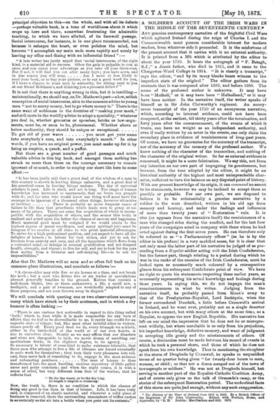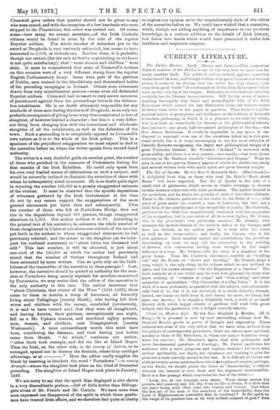A SOLDIER'S ACCOUNT OF THE IRISH WARS IN
THE MIDDLE OF THE SEVENTEENTH CENTURY.* ANY genuine contemporary narrative of the frightful Civil Wars which agitated Ireland daring the reign of Charles I. and the Commonwealth must possess considerable interest for modern readers, from whatever side it proceeded. It is the misfortune of the present account that it carries with it no external authority. It is printed from a MS. which is attributed by the editor to about the year 1750. It bears the autograph of "F. Betagh, S.J.," a Jesuit father, who died in 1811, and it came to the Clongowes-Wood College in 1814. "It is clearly a transcript," says the editor, "and by its many blanks bears witness to the imperfect state of the original." The editor gathers from its contents that it was composed after 1682, and before 1688. The name of the professed author is unknown. It may have been "Mulhol]," or it may have been "Mulholland," or it may have been neither. In the narrative itself, the writer speaks of himself as in Sir John Clotworthy's regiment. An anony- mous transcript of the year 1750 of an anonymous narrative, which, according to internal evidence, could not have been composed, at the earliest, till thirty years after the termination, and forty years after the commencement, of the events of which it treats,- can have no weight as an independent authority, and even if really written by an actor in the events, can only claim the secondary place in evidence of reminiscences of long-past years. Of course, we have no guarantee for the accuracy of the transcript, nor of the accuracy of the memory of the professed author. We know nothing of the character of the transcriber, and nothing of the character of the original writer. So far as external evidence is concerned, it might be a mere fabrication. We say this, not from any intention on our own part of impugning its genuineness, but because, from the tone adopted by the editor, it might be an historical authority of the highest and most unimpeachable char- acter, sufficient to turn the balance on any disputed point of history. With our present knowledge of its origin, it can command no assent to its statements, however we may be inclined to accept them as possible or probable. For our own part, -we are disposed to believe it to be substantially a genuine narrative by a soldier in the wars described, written in his old age from memory and hearsay, and under the feelings and influences of more than twenty years of " Restoration " rule. It is also (as appears from the narrative itself) the reminiscences of a man who changed sides during the conflict, and for the last four years of the campaigns acted in company with those whom he had acted against during the first seven years. He can therefore only be referred to as "a Parliamentary officer" (as he is by the editor in his preface) in a very modified sense, for it is clear that not only must the latter part of his narrative be judged of as pro- ceeding from a Royalist soldier acting with the Irish Confederates, but the former part, though relating to a period during which he was in the ranks of the enemies of the Irish Confederates, must be looked upon as necessarily much coloured by a retrospective glance from his subsequent Confederate point of view. We have no right to quote his statements respecting these earlier years, as necessarily representing his actual knowledge and feelings during those years. In saying this, we do not impugn the man's conscientiousness in what he writes. Judging from the narrative itself, he probably passed from Monk's army to that of the Presbyterian-Royalist, Lord Inchiquin, when the former surrendered Dundalk, a little before Cromwell's arrival in Ireland, and he went over, probably not as a single deserter on his own account, but with many others at the same time, as a Royalist, to oppose the new English Republic. His narrative has left on our mind the impression that he does not lie or misrepre- sent wilfully, but where unreliable is so only from his prejudices, his imperfect knowledge, defective memory, and want of judgment in accepting idle gossip and the misstatements of others. Of course, a distinction must be made between his record of events in which he took a personal share, and those of which he does not speak from his own knowledge. Thus in mentioning the slaughter at. the storm of Drogheda by Cromwell, he speaks in unqualified terms of no quarter being given "for twenty-four hours to man, woman, or child ; so that not a dozen escaped out of the town of townspeople or soldiers." He was not at Drogheda himself, but serving in another part of the Royalist-Catholic Coalition Army, and of course only gives us the talk of Ormonde's camp, or the stories of the subsequent Restoration period. The undoubted facts of this storm are quiteintd enough, without any such exaggeration.
The History of the Warr of Ireland from 1641 to 1653. By a British Officer of the Regiment of Sir John Clotworthy. Edited, with Preface, Note; and Appendix, by "E. EL" Dublin: ffiacGlashan and Gill. 1878.
Cromwell gave orders that quarter should not be given to any who were armed, and with the exception of a few hundreds who were shipped to the Plantations, this order was carried out. Of course some—how many we cannot ascertain—of the Irish Catholic citizens would be found in arms by the side of the regular Royalist soldiers. The whole number of defenders put to the sword at Drogheda is very variously estimated, but seems ta have amounted to 3,000, or thereabouts. Besides these, it is probable, though not certain (for the only authority approaching to evidence is not quite satisfactory), that "some women and children" were slain. It must be remembered that some of Cromwell's soldiers on this occasion were of a very different stamp from the regular English Parliamentary Army. Some were part of the garrison of Dublin, men trained in the bloodthirsty and demoralised habits of the preceding campaigns in Ireland. Others were volunteers drawn from very miscellaneous sources—some even old disbanded Royalist soldiers. Cromwell had to resort to very severe measures of punishment against them for proceedings towards the defence- less inhabitants. He is no doubt ultimately responsible for any misdeeds of these men during the storm of Drogheda, as an only too probable consequence of giving to an army thus constituted orders of slaughter, of however limited a character ; but this i3 a very differ- ent thing from charging him with the intentional and wholesale slaughter of all the inhabitants, as well as the defenders of the town. Such a proceeding is as completely opposed to Cromwell's own nature as it is to the whole of his Irish policy. This is a specimen of the prejudiced exaggeration we must expect to find in the narrative before us, where the writer speaks from second-hand authority.
The writer is a very doubtful guide on another point, the number of those who perished in the massacre of Protestants during the first months of the Irish Rebellion. He could only speak from his own very limited means of information on such a subject, and would be naturally inclined to diminish the atrocities of those with whom he subsequently acted in concert. Ire is no doubt quite right in rejecting the number 140,000 as a grossly exaggerated estimate of the victims. It must be observed that the specific depositions of witnesses gathered by the Irish Government at the time do not by any means support the exaggerations of the more
general statements put forth then and subsequently. Thus the number of those who fell at Portadown Bridge does not rise in the depositions beyond 180 persons, though exaggerated elsewhere to 1,000. Our author reduces it to 90. According to the printed text of his narrative, he estimates the whole number of those slaughtered in Ulster at not above one-sixtieth of the number put forth in the authors to whose exaggerated statements he had previously referred ; and the actors iu the slaughter (as we inter- pret his confused sentences) at "about twice ten thousand and odd." This last number, it will be observed, is just about one-sixth of the 140,000 at which the author had previously stated that the number of victims throughout Ireland had been estimated by some writers. Can we quite rely on the faith- fulness of the transcriber of the narrative in these passages ? Lest, however, the narrative should be quoted as authority for the mur- ders at Portadown being merely reprisals for murders committed 'by Protestants, we may notice that the editor of the narrative is the only authority in this case. The author mentions that "about Christmas, that winter of the Ware" (1641-1462), there came to them in Antrim a troop of horsemen, all formerly living about Tullaghoge [county Meath], who having left their wives and children with the enemy, concluded (erroneously, it is said to have turned out5 that they were all slaughtered, and leaving Antrim, their garrison, surreptitiously one night, fell on a Mr. Upton's tenants, and murdered eighty persons, men, women, and children, near Templepatrick [county Westmeath]. A most extraordinary march this must have been, considering the distance, and their having just before come from Meath. "At which," continues our author, "other Scots took example, and did the like at Island Magee. Then the Irish, on the other side, in the county of Antrim, to be revenged, spared not to destroy the Scottish, where they could get
advantage, as at ." Here the editor coolly supplies the blank by inserting in brackets the word " Portadown "—in county Armagh—where the slaughter took place on the 22nd of December preceding. The slaughter at Island Magee took place in January, 1642.
We are sorry to say that the spirit thus displayed is also shown in a very discreditable preface,—full of little better than Billings- gate abuse of Mr. Froude and Mr. Carlyle. We have more than once expressed our disapproval of the spirit in which those gentle- men hare treated Irish affairs, and we therefore feel quite at liberty to express our opinion as to the ungentlemanly.style of the editor of the narrative before us. We could have wished that a narrative, which, though not adding anything of importance to our previous knowledge, is a curious addition to the details of Irish history, had fallen into hands which would have presented it under lees invidious and suspicious auspices.



































 Previous page
Previous page